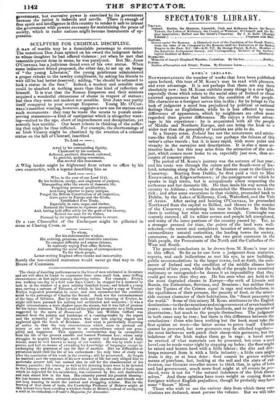The chain of dazzling performances in the lives of men
celebrated in literature and art will often be found to commence from some small link, some trifling circumstance, at first sight scarcely deserving notice. For example : Evelyn was walking one day in a field near Says Court ; he stopped for a moment to look in at the window of a poor solitary thatched house, and beheld a young man carving a cartoon of Tintoret, of which he had bought a copy at Venice. Evelyn requested permission to enter, and soon recommended the youthful artist to the patronage of Charles the Second. Such was the commencement of the fame of Gibbons. But for that walk and that listening of Evelyn, he might still have pursued his solitary toil unfriended and unknown : it was a slight circumstance, a mere shadow upon the stream, but it was full of promise for his future fortunes. Tickell owed all his political prosperity to a little poem suggested by the opera of Rosamond. The late William Gifford was rescued from the penury and hardships of a coasting-trader by the report and the sympathy of the fish-women who saw him playing ragged and neglected upon the beach of Brixham. And what is particularly deserving of notice is, that the very circumstances which seem to portend our injury or our ruin often promote to an extraordinary extent our pros- perity and happiness. This apparent contradiction may be exemplified from the life of the present amiable and learned Professor Lee ; whose early struggles to acquire knowledge, amid the poverty and depression of daily labour, must be well known to many of our readers. He was by trade a car- penter, and bad no means of extending his knowledge of languages except by exchanging the grammar of one for that of another. But no difficulties or privations could chill the fire of his enthusiasm; his only time of study was after the conclusion of his work in the evening ; still he persevered. At length be married ; and the expenses of his new manner of life not only obliged him to u ndertake severer toil, but seemed also to call for the abandonment of his literary pursuits; his evening as well as his morning hours were to be devoted to the hammer and the saw. At this critical juncture, the chest of tools upon which he depended for his subsistence, was consumed by fire, and destitution and rnin stared him in the face. His calamity proved his greatest blessing : his loss became known, attracted attention to his character, and friends were not long wanting to assist the patient and struggling scholar. But for the burning of that chest of tools, the Cambridge Professor of Hebrew might at this instant have been mending a window-frame at Bristol, instead of occupying a stall in its cathedral.—Fraser's Magazine for December.


























 Previous page
Previous page